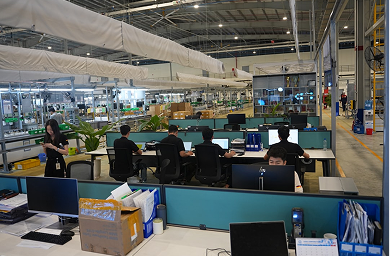Amidst the turbulence of the global economy, Vietnam is emerging as one of Southeast Asia’s key production and assembly centers for electronic and semiconductor components. Along with this, the demand for unskilled labor in the semiconductor sector is continuously rising, as industrial zones and FDI companies make substantial investments in the Vietnamese market. However, behind this development lies significant challenges for the unskilled workforce, especially in the highly competitive semiconductor industry.
Recruitment Trends for Unskilled Labor in the Semiconductor Industry
According to a recent report by Vietnam's Ministry of Industry and Trade, as of 2024, major industrial zones in provinces such as Bac Ninh, Binh Duong, and Ho Chi Minh City are “thirsty” for unskilled labor to meet the production demands of electronic and semiconductor component factories. Many FDI companies, particularly from Japan, South Korea, and Taiwan, have planned large-scale recruitment efforts through 2025 to expand production in Vietnam. Specifically, several major technology companies are planning to expand their factories in the northern region, forecasting thousands of new job opportunities for workers in the semiconductor sector.
Experts predict that with the strong growth of the semiconductor industry, Vietnam will need around 150,000 new workers over the next three years. This development not only opens up significant employment opportunities for workers but also drives local economic growth. However, these opportunities come with challenges, as the pressure of work and skill requirements for unskilled labor are also evolving.
Challenges Behind Employment Opportunities
Alongside increasing recruitment, the pressure on skills and labor quality is also becoming a significant issue for companies. Working in semiconductor manufacturing requires patience, attention to detail, and the ability to quickly adapt to technology. However, many unskilled workers lack formal training in these specialized skills, creating a considerable gap between employers’ requirements and workers' actual capabilities.
![]()
A worker shared, “Working in the semiconductor industry requires not only physical effort but also meticulous attention to every detail. Even a small mistake in the production process can lead to product rejection.” This is why many FDI companies set strict recruitment criteria, requiring workers to undergo multiple rounds of training and probation.
Moreover, unskilled labor in the semiconductor sector also faces high-intensity working conditions. Some companies have implemented shift work schedules, requiring employees to work around the clock. This not only affects their health but also places significant psychological pressure on workers.
Vision for 2025: Opportunities and Solutions for Unskilled Workers
In light of the current situation, the question arises: Can Vietnam’s semiconductor industry continue to grow sustainably, and can unskilled workers genuinely benefit from this massive recruitment wave? To achieve this, specific solutions are needed to improve the quality of the unskilled workforce, enabling them to adapt better to increasingly demanding job requirements.
Labor experts recommend that, in addition to basic skill training, companies should focus on specialized training in technology and production processes. Additionally, creating a safe, friendly working environment should be prioritized to alleviate pressure on workers. Furthermore, government agencies need to develop supportive policies regarding welfare, insurance, and working conditions to protect the rights of unskilled labor.
Improving recruitment processes is also essential. FDI companies should be more flexible in training and enhancing the capabilities of new workers, helping them quickly adapt to technology and improve productivity. The government could also support this by developing short-term vocational training programs within industrial zones, enabling workers to easily transition into new roles.
A Long Journey Toward Sustainable Development
Unskilled labor in Vietnam's semiconductor industry faces an unprecedented opportunity, yet also numerous challenges. In this journey, raising labor quality is essential to ensure the sustainable growth of the semiconductor sector and to help unskilled workers truly benefit from these positive changes.
Vietnam is not only a potential labor market but also an attractive destination for global FDI companies. To maintain this advantage, investing in people—in the unskilled workers workforce—is indispensable. Industrial zones require not only the hands of labor but also well-equipped minds, a readiness to learn, and workers dedicated to their craft.
Zalo GLA – HR: Việc làm kỹ sư can get HOT JOB opportunities now.


